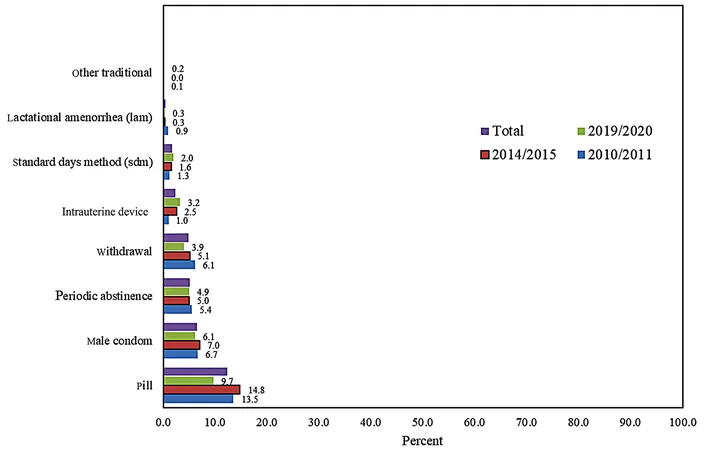
Alarming Rise in Family Planning Discontinuation Among Rwandan Women: A Study Unveils the Hidden Factors Behind the Trend
2024-11-11
Author: Daniel
Introduction
Family planning (FP) is a critical component in reducing unwanted pregnancies, unsafe abortions, and maternal and child mortality. It is particularly significant in the context of the Sustainable Development Goals (SDGs), especially Goal 3, which aims to ensure healthy lives and promote well-being for all at all ages. Despite notable efforts in Rwanda, the past decade has revealed a troubling trend: a striking 30% of women discontinue their use of FP methods. In a bid to uncover the underlying reasons for this phenomenon, a comprehensive analysis was conducted utilizing three rounds of the Rwandan Demographic Health Survey (RDHS) from 2010 to 2020.
Methodology Overview
The study employed a robust pooled data analysis involving three RDHS conducted during 2010-11, 2014-15, and 2019-20. Utilizing Stata Version 17.0, researchers analyzed a sample of thousands of women aged 15-49, drawn through a meticulous multistage stratified sampling method. The aim was to pinpoint factors that contributed to the discontinuation of FP, utilizing both bivariate and multivariate logistic regression models for analysis. A statistical significance threshold was set at p < 0.05.
Key Findings
1. **Rising Discontinuation Rates**: The discontinuation rates increased alarmingly from 17% in 2010-11 to 29% in 2019-20. 2. **Statistically Significant Factors**: The study identified several demographic and socio-economic characteristics linked to higher odds of discontinuation, including: - Age: A staggering 7.71 times more likely for those aged 20-34 compared to the youngest group (15-19). - Marital Status: Currently married women were 11.57 times more likely to discontinue FP than never-married counterparts. - Education: Women with no formal education faced 1.39 times greater odds of stopping their contraceptive methods. - Economic Status: Women from poor households had over five times the odds of discontinuation compared to those from wealthier backgrounds. - Health Access: Visiting health facilities in the past year was linked with a 1.56 times increase in discontinuation. 3. **Motivations for Discontinuation**: The leading reasons for discontinuation were fear of side effects (31.2%) and the desire to become pregnant (27.5%).
Context of the Study
Despite significant strides in FP programs, substantial gaps remain in meeting the needs of women of reproductive age. Reports estimate that 139 million African women wish to avoid pregnancy but are not using any contraceptive methods, posing serious risks to maternal and child health. The issue is exacerbated in Rwanda, where the trend of increased FP discontinuation raises concerns regarding the country's progress toward its family planning goals. The findings align with broader regional trends observed in sub-Saharan Africa, where high rates of FP discontinuation can lead to unintended pregnancies. This is especially critical in Rwanda, where achieving the projected UN target of 2.4 children per woman by 2050 appears increasingly at risk due to these discontinuation rates.
Conclusions and Recommendations
In conclusion, the study elucidates a worrying trend of family planning discontinuation among Rwandan women, correlated significantly with factors such as age, education, marital status, and economic conditions. The increasing rates from 2010 to 2020 highlight a pressing need for targeted interventions to reduce discontinuation and encourage consistent usage of FP methods. To counteract this trend, stakeholders must focus on enhancing education about family planning options and addressing the fears surrounding side effects that deter usage. Furthermore, improving access to quality health care and empowering women through education and economic support may lead to a more favorable landscape for family planning in Rwanda.
Join the Conversation!
What can be done to better support women's health in Rwanda? Share your thoughts on social media using the hashtag #RwandaFamilyPlanning!

 Brasil (PT)
Brasil (PT)
 Canada (EN)
Canada (EN)
 Chile (ES)
Chile (ES)
 Česko (CS)
Česko (CS)
 대한민국 (KO)
대한민국 (KO)
 España (ES)
España (ES)
 France (FR)
France (FR)
 Hong Kong (EN)
Hong Kong (EN)
 Italia (IT)
Italia (IT)
 日本 (JA)
日本 (JA)
 Magyarország (HU)
Magyarország (HU)
 Norge (NO)
Norge (NO)
 Polska (PL)
Polska (PL)
 Schweiz (DE)
Schweiz (DE)
 Singapore (EN)
Singapore (EN)
 Sverige (SV)
Sverige (SV)
 Suomi (FI)
Suomi (FI)
 Türkiye (TR)
Türkiye (TR)
 الإمارات العربية المتحدة (AR)
الإمارات العربية المتحدة (AR)